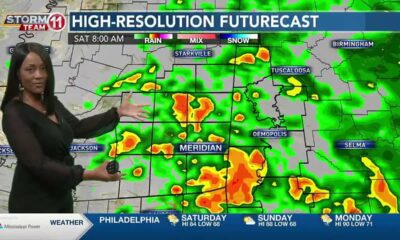Mississippi Today
Mississippi hospital officials say marketplace insurance helps, but not as much as Medicaid
Mississippi Senate leaders point to one component of the federal Affordable Care Act health care law as a reason not to expand Medicaid to provide health care coverage to the working poor.
The Senate has passed legislation to allow only those earning less than 100% of the federal poverty level (about $15,000 annually for an individual) and who are working to be covered by Medicaid.
A state House plan would provide Medicaid coverage to those earning up to 138% of the federal poverty level (about $20,000 annually) as is allowed under the Patient Protection and Affordable Care Act, also known as Obamacare.
House and Senate leaders are expected to begin negotiations in the coming days in an attempt to work out the differences between the two chambers.
One reason Senate leaders give for not expanding to provide Medicaid coverage to those earning between 100% and 138% of the federal poverty level is that people who fall into that income category can obtain private insurance through another component of the ACA – the Affordable Care Act Marketplace or “exchange.” People can receive private insurance through the exchange and receive federal help to pay for the policy.
“We want to keep more people on the exchange. The reimbursements (to health care providers) are better,” through the exchange than through Medicaid, said Senate Medicaid Chairman Kevin Blackwell, R-Southaven. “A lot of the argument for expansion has been to help the hospitals. Well, if you are going to take the people who currently have commercial insurance and put them on Medicaid, you just killed your hospitals.”
While the exchange policies assist people who otherwise would not have access to health care coverage, the problem, according to Mississippi hospital officials, is that they often lose money when treating low income people who have the marketplace coverage.
“The bottom line is that Medicaid reimburses at a higher rate,” said Lee McCall, chief executive officer of Neshoba General Hospital in Philadelphia. He said there are some private insurance policies that pay Mississippi hospitals a better reimbursement rate, but not the marketplace plans.
“Most of those marketplace plans, I kind of call catastrophic coverage … ,” McCall said. “For the most part the deductibles are so high many people cannot afford to pay them.”
Kim Hoover, interim chief executive officer of the Mississippi Hospital Association, said Medicaid actually pays state hospitals at the commercial rate – or at the same rate paid by private insurance companies.
Gov. Tate Reeves' Division of Medicaid got approval from federal Medicaid officials to pay at that higher rate last year. The state's hospitals agreed to pay the local matching funds needed to draw down the additional Medicaid dollars to pay at the commercial rate.
With the better rate the hospitals now receive from Medicaid, Hoover said, “The main difference between the two is the typically high deductibles for hospital services on the exchange plans. If the patient deductible isn't paid, then the plan doesn't pay the hospital the full payment. By comparison, Medicaid patients have no deductible.
“No deductible combined with the commercial rate means that Medicaid is typically better for providers and patients than the exchange plans,” Hoover continued.
Hoover cited an example of “a 54-year-old male in Hinds County making $17,000 a year could pay a monthly premium of $16.85 with a deductible of $6,350 for one of the exchange plans. In this case, the deductible is over 33% of the person's pre-tax income. Recently, Mississippi led the nation in medical debt bankruptcies. Medicaid expansion would better protect these patients from medical debt.”
Granted, thanks to changes made to the exchange during the pandemic, low income people can get a policy better than what Hoover described. With federal help people between 100% and 138% of the federal poverty level can get a plan with little or no monthly premiums. But there are still out of pocket costs or deductibles for the policyholder on the marketplace plans, though currently less than the amount cited by Hoover.
For instance, on the federal HealthCare.gov website where Mississippians would go to obtain a marketplace plan, a 40-year-old earning $19,000 annually could obtain a plan with a monthly premium of less than $5. But there would be $1,650 out of pocket expenses for one plan.
In general, out of pocket expenses represent the most a person would pay in a year for in-network health care services.
The benefits offered by the marketplace plans have been enhanced through COVID-19 relief legislation passed during the President Joe Biden Administration. Because of that legislation, people pay lower monthly premiums and less in out of pocket expenses than they did previously.
Robin Rudowitz, director of Program on Medicaid and the Uninsured for KFF, said the “the enhanced coverage subsides” people currently are benefitting from are set to expire in 2025. After that, people will be paying more for premiums and more in deductibles and out of pocket expenses.
In addition, Rudowitz pointed out that according to a recent consumer survey, people with Medicaid, even though they generally have more serious health care issues and thus more opportunities for problems, rate their coverage through Medicaid higher than those on private marketplace plans rate their policies.
State Insurance Commissioner Mike Chaney was one of the first state officials to argue in favor of expanding Medicaid just to those earning less than 100% of the federal poverty level to ensure the people above that income level remained in the marketplace.
Chaney said there are about 140,000 Mississippians between 100% and 138% of the federal poverty level who have insurance through the marketplace. Under the federal law, if those people are eligible for Medicaid expansion, through an expansion in their state, they no longer would receive the federal help with the private insurance option. With no federal financial assistance, low income people would not be able to afford the marketplace plans.
Moving those people to Medicaid “would destroy the exchange,” Blackwell said. But 40 other states have expanded Medicaid, and they still have exchange policies for those earning too much to qualify for Medicaid expansion.
Some states, such as Arkansas, have used Medicaid expansion funds to pay for private policies for those who would qualify for Medicaid expansion. The federal government allows those states to use their Medicaid expansion funds to pay for the costs of the private health insurance.
The federal government pays 90% of the health care costs for Medicaid expansion. But the federal government would not recognize the Senate plan as Medicaid expansion and thus would pay only 77% of the costs, thus costing the state more to cover fewer people, according to various studies. The federal government also will pay Mississippi an additional nearly $700 million over a two-year period as an incentive to expand Medicaid.
KFF, the national non profit that studies health care issues, “estimates that approximately 166,000 uninsured adults would be eligible for expansion – this includes 102,000 who currently fall into the coverage gap (earning less than 100% of the federal poverty level) and another 64,000 who have incomes between 100% and 138% and could be eligible for marketplace coverage but not enrolled.”
In addition there are 140,000 Mississippians who have private insurance through the exchange would have to drop their policy and sign up for Medicaid if expansion is approved by the Legislature.
Based on the experiences of hospital officials, replacing those private policies with Medicaid would not necessarily be a bad thing.
This article first appeared on Mississippi Today and is republished here under a Creative Commons license.
Mississippi Today
Mississippi GOP leaders come to Trump’s defense after guilty verdict
Most Mississippi Republican politicians quickly took to social media this week to defend Donald Trump and to attack the New York justice system after the former president was convicted of 34 felony charges.
The former president was found guilty of charges related to falsifying business records to conceal that just before the 2016 election he paid off porn actress Stormy Daniels to conceal a sexual encounter.
Mississippi politicians, claiming the guilty verdict was politically motivated to harm Trump's election chances, echoed some of the same attacks they used in 2020 after they falsely claimed, like Trump, that the presidential election was stolen. In 2020, many Mississippi politicians supported the former president's effort to throw out votes cast by millions of Americans in order to reverse the outcome of the election.
READ MORE: Several Mississippi Republicans among those seeking to throw out millions of ballots
Mississippi Gov. Tate Reeves, who twice was endorsed by Trump, said on social media: “The lawless conviction of President Donald Trump only reflects the desperation of President Biden and the corrupt methods he will use to steal this election. I am confident that justice will prevail, and the people of America will not reward the leftwing wannabe dictators abusing our justice system in November.”
Reeves falsely blamed the conviction on President Joe Biden, who defeated Trump in 2020. The pair will most likely face off again in November as both vie for a second term. But Trump was not convicted by the U.S. Department of Justice. The case was brought by state District Attorney Alvin Bragg, who was democratically elected by voters of Manhattan, where Trump has lived for most of his life.
State Sen. Brice Wiggins of Pascagoula, who did not attack the jury verdict, was an exception among Mississippi Republicans on social media.
“All jurors deserve thanks and respect. They are the foundation of the best judicial system in the world (though not perfect).” He added that the Republicans leadership “has a lot of soul searching to do.”
He also posted, “Thomas Jefferson wrote, ‘I consider [trial by jury] as the only anchor yet imagined by man, by which a government can be held to the principles of its constitution.'”
Some came to Wiggins' defense on social media, but he was attacked by many for his defense of the jury system. Before being elected to the state Senate, Wiggins served as an assistant district attorney prosecuting criminal cases before juries.
Mississippi U.S. Reps. Trent Kelly and Michael Guest were also local prosecutors before they were elected to Congress, but it did not stop them from attacking the jury verdict.
Kelly, who served as district attorney in northeast Mississippi before being elected to the 1st District U.S. House seat, said on social media: “The verdict against President Trump is a travesty! This action moves us closer to less than a democracy. This political prosecution is a mockery of the American Constitution, and a miscarriage of justice.”
And Guest, who now holds the 3rd District House seat but was previously a district attorney for Madison and Rankin counties, offered similar comments.
“Former President Donld Trump was convicted today on charges that were politically motivated and the evidence presented against him did not arise to the level of reasonable doubt. All Americans are entitled to a fair trial brought by an impartial prosecutor. President Trump was not afforded these fundamental protections and his conviction should be overturned.”
U.S. Rep. Mike Ezell, a former Gulf Coast sheriff, who represents the 4th District in Congress, like Reeves incorrectly blamed the prosecution on federal officials.
“Today's verdict—and this entire trial—was based in politics, not the law. The Biden Admin. and their allies continue to weaponize our justice system against their political enemies,” Ezell said. “I look forward to seeing this ridiculous, partisan verdict quickly appealed and overturned.”
State Auditor Shad White and state Attorney General Lynn Fitch, like prosecutors, often depend on juries as part of their job.
White said: “Democrats love to talk about how important democracy is, but today we saw a justice system weaponized to undermine democracy. What a travesty. Make America Great Again.”
Fitch said in a statement: “In a New York courtroom, the American legal system was manipulated for political gain and weaponized against former President Trump. The trial only emphasizes the profound partisan divide in the United States and the outcome sets a concerning precedent for future proceedings. I have faith in the rule of law and expect that on appeal justice will prevail even against this brash manipulation.”
In 2020, Fitch's office joined in a lawsuit that tried to throw out millions of votes in an effort to overturn the election. That lawsuit was quickly dismissed by the U.S. Supreme Court.
Secretary of State Michael Watson said: “If they can do it to DJT, they can do it to you. As an aside, if any businesses are looking to get out of NY, our tax structure and regulatory reform measures have Mississippi on the rise. Come on down.”
Andy Gipson, the commissioner of agriculture and commerce, said: “Liberals are coming after conservatives, but I still stand with President Donald J. Trump. Join me in praying for him as he appeals the verdict from a rigged and politically motivated witch hunt of the New York trial. We the voters will have the last word.”
Lt. Gov. Delbert Hosemann said simply: “The election is in November. The voters will make the final decision on our president, who will be Donald Trump.”
And state Treasurer David McRae said: “I stand with Trump.”
U.S. Sen, Roger Wicker, who voted to certify the election in 2020 despite Trump's objections, said: “This prosecution has been an outrageous perversion of our system of justice. Unless reversed, it could set a disturbing precedent in which our courts are weaponized by one party against the other. Today is a dark day for the rule of law.'
And junior U.S. Sen. Cindy Hyde-Smith posted on X, formerly Twitter, the word “truth” in response to a statement of Senate Republicans criticizing the outcome of the trial.
U.S. Rep. Bennie Thompson, Mississippi's highest-ranking Democrat and sole Black member of the state's congressional delegation, said on social media: “Today's verdict confirms what we have always known: Donald Trump is a criminal who thinks nothing of breaking the law, or our Constitution, to get what he wants. No one, especially an ex-president, is above the law.”
Thompson, who headed a select committee that looked into the attack on the Capitol on Jan. 6, 2021, by those trying to stop the certification of the election and Trump's role in that attack, added, “Justice has prevailed.”
READ MORE: ‘An attempted coup': Rep. Bennie Thompson tells the world what happened on Jan. 6, 2021
This article first appeared on Mississippi Today and is republished here under a Creative Commons license.
Mississippi Today
Rick Cleveland to be inducted into MPA Hall of Fame
Rick Cleveland, a columnist and correspondent for Mississippi Today, will be inducted into the Mississippi Press Hall of Fame during the 158th Annual Meeting on June 28 in Biloxi,.
Cleveland, an award-winning journalist who has spent decades chronicling sports in Mississippi, is the first sports journalist to be inducted. He has been recognized 13 times as Mississippi Sports Writer of the Year.
“Rick is one of Mississippi's most treasured storytellers,” said Mary Margaret White, Mississippi Today CEO and executive director. “We are so proud to see his years of sports journalism recognized with this incredible honor by the Mississippi Press Association.”
A Hattiesburg native, Cleveland graduated with a journalism degree from the University of Southern Mississippi. He went on to work at the Hattiesburg American, Monroe (La.) News Star World, Jackson Daily News and Clarion Ledger as a reporter, editor and columnist.
After leaving the Clarion-Ledger in 2012, he served for several years as executive director of the Mississippi Sports Hall of Fame. His work as a syndicated columnist and sports writer has appeared in magazines, periodicals and newspapers. He is the author of four books. His latest, the “Mississippi Football Book,” was published in 2023.
This article first appeared on Mississippi Today and is republished here under a Creative Commons license.
Mississippi Today
On this day in 1921


MAY 31, 1921

The Tulsa race massacre began after a white mob gathered at a jail where a Black teen had been arrested on false charges of “attacking” a white girl in an elevator.
In reality, he may have tripped or bumped into her. Although authorities exonerated him, that didn't stop the mob.
“As the whites moved north, they set fire to practically every building in the African American community, including a dozen churches, five hotels, 31 restaurants, four drug stores, eight doctor's offices, more than two dozen grocery stores, and the Black public library,” according to a 2001 report on the massacre.
That rampage left as many as 300 dead and 10,000 homeless. “They tried to kill all the Black folks they could see,” recalled George Monroe, who was 5 at the time. The Black community known as Greenwood bore the name of the Mississippi Delta town. Greenwood, known as the “Black Wall Street” for its bustling businesses, became a pile of ashes.
No one was ever prosecuted for these crimes. Viola Fletcher, a 107-year-old who survived, said, “I have lived through the massacre every day. Our country may forget this history, but I cannot. I will not. And other survivors do not. And our descendants do not.”
The community that once sprawled beyond 35 blocks is now just one block. A 7,000-square-foot museum, Greenwood Rising, now honors that community.
This article first appeared on Mississippi Today and is republished here under a Creative Commons license.
-
SuperTalk FM6 days ago
Mississippi businessman accused of working with mafia boss in fraud scheme pleads guilty
-
Local News Video4 days ago
Mental Health Awareness Month: Addiction and your mental health
-
Mississippi News7 days ago
Mississippi trooper hit by vehicle while conducting checkpoint
-
Mississippi News6 days ago
Gym for children with special needs opens in Tupelo
-
Mississippi Today5 days ago
On this day in 1958
-
SuperTalk FM5 days ago
Could Memorial Day have started in Mississippi? This expert believes so
-
SuperTalk FM4 days ago
Atlantic hurricane season expected to be worst in years
-
Mississippi Today7 days ago
On this day in 1774

































